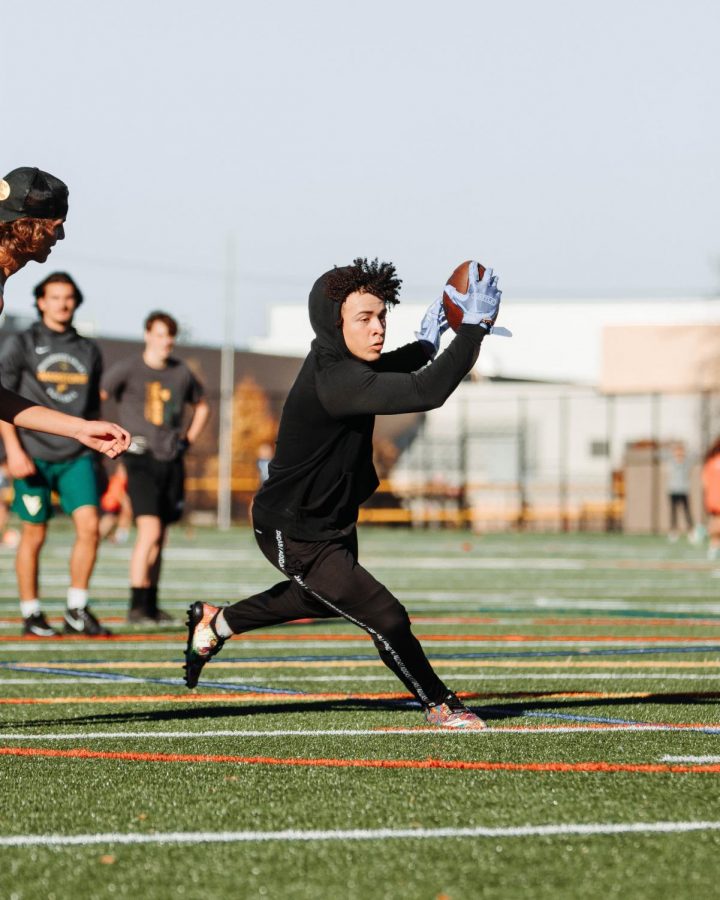Student athletes, coaches learn to cope with coronavirus
Naperville Central High School junior and varsity running back Antonio Torres makes a run after receiving the ball in a non-school sanctioned seven-on-seven practice camp against Waubonsie Valley High School at the Knoch Park multipurpose turf field in Naperville.
February 18, 2021
Student athletes have been dealing with an unusual sports season due to the coronavirus. The effects of the constantly changing sports seasons are affecting everyone involved, students and coaches alike.
The COVID-19 pandemic has caused restrictions to be placed on most school and club sports. In Illinois, indoor sports have been in a forced shut down since the end of November. It has been a struggle for athletes and coaches to deal with the ever-changing sports limitations.
“The greatest challenge for volleyball is learning to train in a team sport environment that aims to keep athletes as safe as possible,” said Brie Isaacson, a director of Club 1 Volleyball and girls varsity volleyball coach at Naperville Central High School.
Coaching in an unprecedented situation such as this one has required coaches to get creative with drills that were once executed without hesitation, especially with team sports. In addition to having to adapt to a new playing style, athletes have also missed crucial aspects of their sport that aren’t just about practice time.
“I have not gotten the chance to get to know my teammates as well as I usually would,” said Jaclyn Westphal, a sophomore volleyball player for both Naperville Central and for Club 1 Volleyball. “It’s harder to get to know each other the way we would in the normal season.”
The social aspect of sports that student athletes cherish has been largely taken away since the onset of the pandemic. The bonds that are made with teammates are one of the most valuable aspects of being a student athlete, they are a large reason athletes have a love for their sport. Athletes that have had the chance to practice their sport have had to abide by new restrictions that can be difficult to get used to.
“The greatest challenge for athletes initially was learning to play a sport with a mask on,” Isaacson said. “But I have watched this at both the high school level and the club level and athletes have done a great job with it.”
Athletes have had to withstand the new restrictions and adjustments to be allowed to play under the unusual circumstances. Although these restrictions are necessary for the health and safety of everyone, they can be burdensome at times. The uncertainties of playing time is another result of this pandemic that has caused issues for student athletes.
“I made no improvements this season due to the lack thereof,” said Annie Trompeter, a sophomore soccer player. “Working as a team is a huge part of soccer and being only able to better my skills individually stunted my growth a lot.”
High school is a crucial period of time for sports improvement, especially for athletes looking to play in college, and, at this age, many student athletes have goals to play at the collegiate level. Athletes who are in the recruiting process have had an unordinary experience. Athletes who are in the recruiting process have had an unusual experience due to the National Collegiate Athletic Association rules.
“The recruiting process has been a bit of a challenge for our older athletes,” Isaacson said. “With that said, creativity has played a role in allowing college coaches to see athletes. Athletes are working harder to send videos to coaches in lieu of big tournaments.”
This pandemic is uncharted territory for everyone, and many are craving some normalcy during this time. Playing sports in various capacities can be a way to do so.
“Being able to play sports is something that not only is good for mental and emotional health, it also helps to keep your body healthy during times like this when it is needed the most,” Trompeter said.
While it is unknown when the return to normalcy for sports will happen, Isaacson said “my hope is that people continue to do their part so we can all get back to the things we love as soon as possible.”







